Each character entry below contains a ≤1 MB QuickTime movie of the character being painted with a brush, created by Prof. Saeko Komori of Chubu University. Please see the JP Net Kanji Project for more details.
In the following definitions, on (Chinese-based) readings are represented by katakana, and by capital romaji letters; kun (native Japanese-based) readings are represented by hiragana, and by lower-case romaji letters. This is a common dictionary convention, and does not have any bearing on meaning.
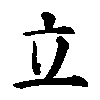
Video: Writing and pronunciation
Printed form: 立
Readings: た (つ)/た (てる) ta
Meaning: to stand up
Mnemonic:
A person standing with feet firmly planted on the ground.
Usage Examples:
立つ (たつ) stand up
立てる (たてる) erect
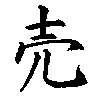
Video: Writing and pronunciation
Printed form: 売
Readings: う (る)/バイ u/BAI
Meaning: to sell
Mnemonic:
Some day you will write and sell a good book that people read 読.
Usage Examples:
売る (うる) sell
売店 (ばいてん) kiosk
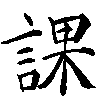
Video: Writing and pronunciation
Printed form: 課
Readings: カ KA
Meaning: section; lesson
Mnemonic:
The word radical 言 and a fruit 果物 [くだもの].
Usage Examples:
課長 (かちょう) section chief
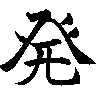
Video: Writing and pronunciation
Printed form: 発
Readings: ハツ HATSU
Meaning: to start; to depart
Mnemonic:
Open the gate 開 right now. People are leaving in all directions!
Usage Examples:
十時発 (じゅうじはつ) (train) departing at 10:00
京都発 (きょうとはつ) (train) departing Kyoto
Printed form: 集
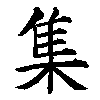
Video: Writing and pronunciation
Readings: あつ (まる)/あつ (める) atsu
Meaning: to gather
Mnemonic:
Birds 隹 gathering on a tree 木. [曜 (よう) "days of week"; 難 (むずか[しい]) "difficult"]
Usage Examples:
集める (あつめる) gather
集まる (あつまる) come together
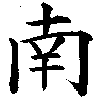
Video: Writing and pronunciation
Printed form: 南
Readings: みなみ minami
Meaning: south
Mnemonic:
Can you see the image of a white-stoned church building in New Mexico?
Usage Examples:
南 (みなみ) south
南口 (みなみぐち) south entrance
南アメリカ (みなみアメリカ) South America
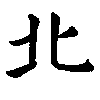
Video: Writing and pronunciation
Printed form: 北
Readings: きた kita
Meaning: north
Mnemonic:
Two persons facing back to back.
Usage Examples:
北 (きた) north
北口 (きたぐち) north entrance
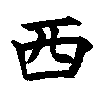
Video: Writing and pronunciation
Printed form: 西
Readings: にし nishi
Meaning: west
Mnemonic:
A picture of a pitcher with lid.
Usage Examples:
西 (にし) west
西口 (にしぐち) west entrance

Video: Writing and pronunciation
Printed form: 回
Readings: カイ kai
Meaning: turn; time(s)
Mnemonic:
A neat design of squares repeated several times.
Usage Examples:
一回 (いっかい) once
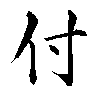
Video: Writing and pronunciation
Printed form: 付
Readings: つ (ける) tsu
Meaning: to attach
Mnemonic:
A person with pulse 寸. [時 (とき; ジ) "time"]
Usage Examples:
受付 (うけつけ) receptionist
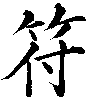
Video: Writing and pronunciation
Printed form: 符
Readings: フ FU
Meaning: tally
Mnemonic:
The bamboo radical 竹 and the kanji 付 for attachment.
Usage Examples:
切符 (きっぷ) ticket
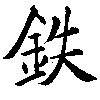
Video: Writing and pronunciation
Printed form: 鉄
Readings: テツ TETSU
Meaning: iron
Mnemonic:
Metal 金 gradually lost 失 through oxidation. [銀 (ぎん) "silver"]
Usage Examples:
地下鉄 (ちかてつ) subway
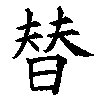
Video: Writing and pronunciation
Printed form: 替
Readings: か (える) ka
Meaning: to exchange
Mnemonic:
People 夫夫 are changing day by day 日.
Usage Examples:
両替 (りょうがえ) money exchange
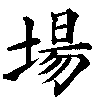
Video: Writing and pronunciation
Printed form: 場
Readings: バ BA
Meaning: place
Mnemonic:
Pigs 豚 under the sun 日 in the mud 土.
Usage Examples:
切符売り場 (きっぷうりば) ticket counter
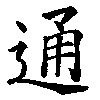
Video: Writing and pronunciation
Printed form: 通
Readings: つう(じる) tuu
Meaning: get through
Mnemonic:
A man マ with errands 用 and the radical of "advance movement".
Usage Examples:
通じる (つうじる) get through
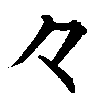
Video: Writing and pronunciation
Printed form: 々
Readings: - -
Meaning: (kanji repetition symbol)
Mnemonic:
A symbol to indicate "pluralism".
Usage Examples:
時々 (ときどき) sometimes
家々 (いえいえ) houses
人々 (ひとびと) people
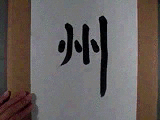
Video: Writing and pronunciation
Printed form: 州
Readings: シュウ SYUU
Meaning: state; province; continent
Usage Examples:
マサチューセッツ州 (しゅう) state of Massachusetts
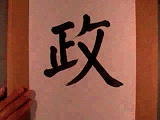
Video: Writing and pronunciation
Printed form: 政
Readings: セイ SEI
Meaning: govern
Usage Examples:
政治家 (せいじか) politician
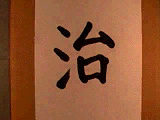
Video: Writing and pronunciation
Printed form: 治
Readings: ジ/ なお (す) ZI / nao (su)
Meaning: govern; rule; cure; heal; remedy; recover
Usage Examples:
かぜが治った。 (かぜがなおった) I recovered from a cold.
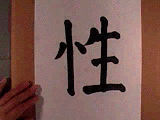
Video: Writing and pronunciation
Printed form: 性
Readings: セイ SEI
Meaning: nature; gender
Usage Examples:
男性 (だんせい) male
女性 (じょせい) female
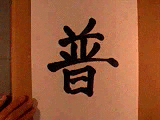
Video: Writing and pronunciation
Printed form:普
Readings: フ HU
Meaning: general; common
Usage Examples:
普通 (ふつう) ordinary
New Readings
| KANJI | READINGS |
|---|---|
| 当日 | (とうじつ), the very day |
| 東口 | (ひがしぐち), east entrance |
| 時々 | (ときどき), sometimes |
| お金 | (おかね), money |
[Quizzes (JavaScript required): Meaning (30 questions) | Reading (20 questions)]
